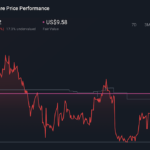Australia will force Meta and Google to pay for news shared on their platforms under a new scheme unveiled on Thursday, threatening to tax them if they refuse to strike deals with local media.
With traditional media companies battling to survive as precious advertising dollars are hoovered up online, Australia wants big tech companies to compensate local publishers for sharing articles that drive traffic on their platforms.
“The rapid growth of digital platforms in recent years has disrupted Australia’s media landscape, and it is threatening the viability of public interest journalism,” Communications Minister Michelle Rowland told reporters.
“It is important that digital platforms play their part. They need to support access to quality journalism that informs and strengthens our democracy.”
Social media platforms with Australian revenue of more than $250 million a year (£125 million) would be taxed a still-to-be-decided figure earmarked to pay for news.
But they would be able to offset the tax – or avoid paying it entirely – if they voluntarily entered into commercial agreements with Australian media companies.
The Australian government indicated the parent companies of Google, Facebook and TikTok would be covered by the tax, which would come into effect next year.
Officials said Elon Musk’s X would likely escape because its domestic revenue was too small.
Hundreds of Australian journalists have lost their jobs in recent years as newspapers are shuttered and media companies downsize.
In 2021, Google and Meta struck a string of deals with Australian newsrooms worth a combined £125 million.
But Meta has indicated it would not renew its deals when they expire in March, arguing that news makes up a tiny portion of its traffic.
The tax would be designed to stop the tech giants from simply stripping news from their platforms, something Meta and Google have done overseas in the past.
A Meta spokesperson on Thursday said Australia was “charging one industry to subsidise another”.
“The proposal fails to account for the realities of how our platforms work, specifically that most people don’t come to our platforms for news content and that news publishers voluntarily choose to post content on our platforms because they receive value from doing so,” a Meta spokesman said.
It comes as Australia last month voted for new laws that would ban under-16s from social media.
It has also mooted slapping fines on companies that fail to stamp out offensive content and the spread of disinformation.






